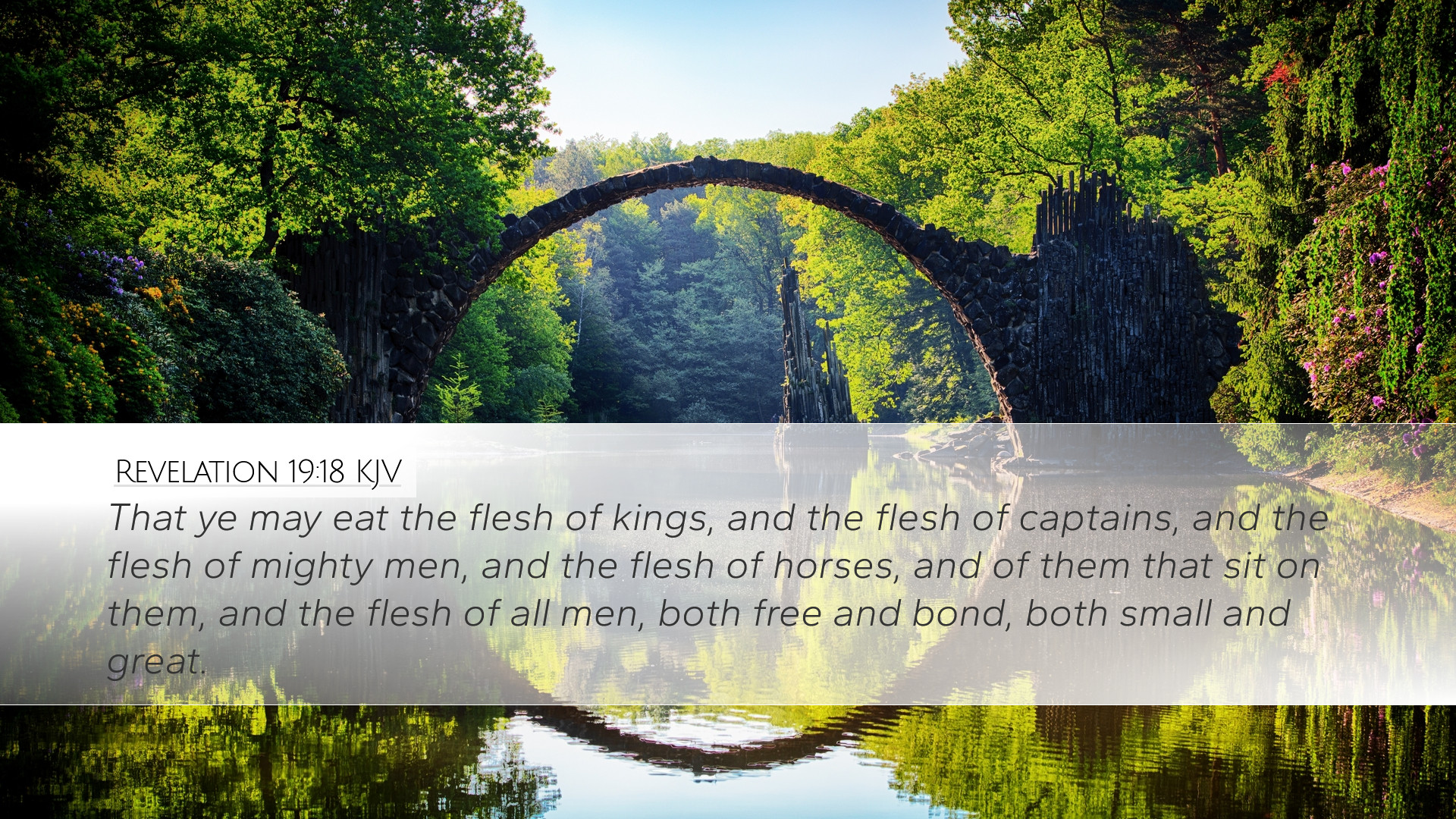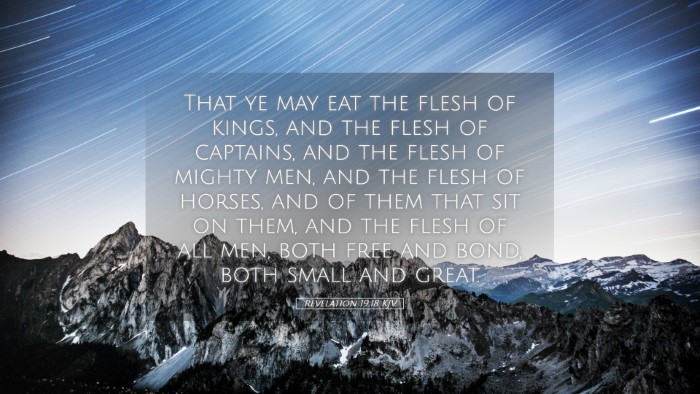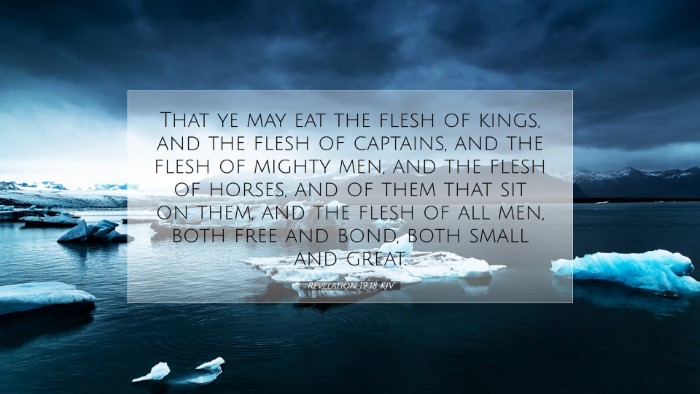Commentary on Revelation 19:18
Text of Revelation 19:18: "And that ye may eat the flesh of kings, and the flesh of captains, and the flesh of mighty men, and the flesh of horses, and of them that sit on them, and the flesh of all men, both free and bond, both small and great."
Introduction
The verse provides a vivid and dramatic image that captures the culmination of divine judgment upon the earth during the apocalyptic events. This commentary seeks to unpack the various layers of meaning found within this passage, drawing insights from various public domain commentaries to present a cohesive and thoughtful interpretation suitable for pastors, students, theologians, and scholars.
Contextual Background
The passage forms part of a larger vision in the Book of Revelation, which portrays the climactic battle between good and evil—the final judgment that God will enact upon the earth. The preceding verses describe the return of Christ and the establishment of His reign, emphasizing His sovereignty and righteousness.
Literary Structure
The verse employs a powerful and striking metaphor that uses the imagery of feasting on the defeated—this is both literal and symbolic. The contrast between the high status of kings and captains, as well as the humility of bondservants, illustrates the equalizing effect of divine judgment.
Commentary Insights
1. Matthew Henry's Perspective
Matthew Henry emphasizes the gravity of this scene. He explains that the call to eat the flesh of kings and the mighty men signifies the total destruction of those who oppose God. The imagery he uses here is reminiscent of the predatory nature of divine retribution, suggesting that those who align themselves against God’s purposes will ultimately face dire consequences. He interprets this as a metaphor for the defeat of pride and earthly power before the sovereignty of God.
- Divine Justice: Henry notes that divine justice will be rendered in a manner that negates the power and status of earthly rulers—highlighting God's ultimate authority.
- Judgment Day: He underscores the importance of this passage as a preview of the final judgment, reminding readers of the spiritual battles they face.
2. Albert Barnes' Interpretation
Albert Barnes brings attention to the literal and figurative implications of the imagery in Revelation 19:18. He draws parallels to the prophetic precedent found in the Old Testament, where the prophets often use graphic imagery to convey God’s impending judgment on nations and leaders. Barnes interprets this passage as God declaring victory over the enemies of His people, highlighting that the 'flesh' symbolizes the physicality of those who have rejected the Lord.
- Physical vs. Spiritual: Barnes emphasizes the gruesome nature of this imagery serves to denote that this victory is not just spiritual but also physical, representing a complete triumph of God’s will over earthly power.
- Inclusivity of Judgment: He also notes the inclusivity in the language—free and bond, small and great—indicating no one is exempt from divine judgment.
3. Adam Clarke's Analysis
Adam Clarke provides a deeper exploration into the figurative language used in this verse. He views it not only as a scene of judgment but also as an image of the transformation of powers. Clarke posits that this 'feast' represents God’s triumph and a public demonstration of His authority over all humanity’s pretensions and rebellions against Him.
- Theological Implications: Clarke asserts that the imagery serves as a theological message that God will not merely defeat sin and evil but will publicly shame those who have stood against Him.
- Warning to the Oppressor: He frames this passage as a warning to those in positions of power that ignoring divine authority leads to destruction and ruin.
Theological Reflections
The overarching message of Revelation 19:18 encapsulates many theological themes central to the Christian faith. The victory of Christ and the judgment against sin are not merely historical events but ongoing realities that have implications for believers today.
1. Sovereignty of God
This verse serves as a stark reminder of God's sovereignty over all creation and human authority. It assures believers that despite the appearance of chaos and injustice in the world, God's plan is being fulfilled, and His justice will prevail.
2. Call to Faithfulness
For Christians, the graphic images also serve as a call to faithfulness amidst persecution or moral decay. The assurance of God's ultimate judgment encourages perseverance and vigilance in maintaining fidelity to God's word and mission.
3. Eschatological Hope
The imagery invites reflection on eschatological hope—promising that while the present world may be rife with conflict and evil, God will bring about a new creation where righteousness prevails, and the power of sin is utterly vanquished. This should compel believers to engage in mission and evangelism with urgency and purpose.
Conclusion
Revelation 19:18 reveals profound truths about divine judgment, human authority, and the ultimate victory of Christ. Drawing from the rich insights of Henry, Barnes, and Clarke, this commentary encourages a deeper understanding of the text's meaning both in its historical context and its contemporary relevance.
As pastors, scholars, and students engage with this passage, it challenges them to consider not just the future implications of God's final judgment, but their present response to spiritual warfare and the call to faithful living.


